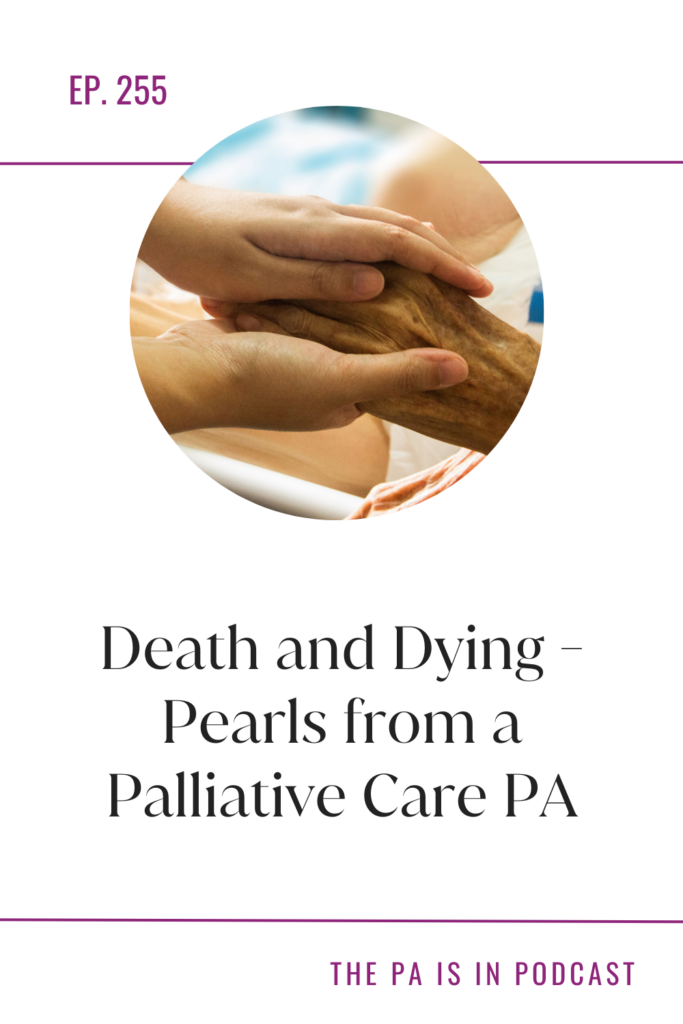
Listen to the Podcast: Apple Podcasts | Spotify
Watch on YouTube

Meet Tracey Piparo, PA-C, DFAAPA
Tracey Piparo has been a PA for 23 years. She worked as an ER PA for 17-18 years and then transitioned to working as a hospitalist PA for about 2 hours. While working as a hospitalist, she found her calling in inpatient palliative medicine. For the past 2.5 years, Tracey has been working in her Unicorn PA job as a Palliative Care PA.
Day in the Life of a Palliative Care PA
Tracey has the opportunity to engage with patients and the people that mean the most to them in one of the hardest times of their lives. She is honored to be the voice of the patient. Everyone deals with death differently and brings their unique life experiences. Tracey wants to give people a voice to tell others how they want to live, not how they want to die.
On average, Tracey’s team has about 25-35 patients on their service. The team consists of 1 PA, 2 NPs, 2 physicians, and 1 social worker. Each provider sees 2-3 new consults per day and rounds on about 10 patients per day.
The team rounds together every morning on all patients on their service. They discuss symptom management and medication options as well as give each other feedback on patients. Most of Tracey’s day is spent in family meetings.
New consults are usually about one hour. First, Tracey will read through chart. She then spends lots of time talking with the patient and their loved ones. Finally, Tracey discusses her plan and the patient’s goals with the primary team.
It’s important that the message shared with the patient and their loved ones needs to be consistent so they can make the best decisions for themselves. Messages need to be consistent from all providers that care for the patient.
Advanced Care Planning
Advanced care planning is appropriate for every single living adult, regardless of age or medical condition. Every PA in every type of medical practice should be addressing advanced care planning with their patients. This is especially true for primary care and family medicine.
PAs should ask every patient at any encounter, “If you can’t talk to me, who is your healthcare proxy/who will make decisions for you?” Do not take for granted that people will figure it out or assume who will be their decision-maker. Every state is different regarding next of kin laws.
Beyond confirming patients’ healthcare proxies, providers can also ask patients if they have a living will or advanced care directives. Providers should prompt patients to ask themselves, “What if something bad happens to me? What do I want next?”
- If I die, do I want to be resuscitated?
- How far do I want to go to try to get better and what does better look like?
This is worth talking about for every patient, regardless of age and medical history. The more patients hear these same questions from every clinician they see, the more likely they are to actually think about these questions and answer them for themselves.
Goals of Care Conversations
Goals of care conversations are appropriate for patients with a serious illness diagnosis, frailty, elderly, or multiple comorbidities. Specific examples of medical conditions include cancer, heart failure, ESRD, stroke, and dementia. Questions patients should ask themselves:
- What types of treatments do I want and not want?
- Do I want invasive or aggressive procedures or treatments?
- Do I want multiple hospitalizations or do I want to prioritize staying at home?
- Do I want to be resuscitated and if so, how long would I want to be on life support?
A palliative care consult is helpful with these conversations. With palliative care, symptoms can be aggressively managed. Patients can also graduate off palliative care service.
Clinical Pearl: How to Ask Code Status
When admitting a patient to an inpatient service, code status should always be addressed.
- Make a recommendation
We do this all the time with other diseases and treatment plans. For example, we don’t ask patients their preference regarding metoprolol or amlodipine. Instead, we choose what is the right medication for each patient and make that recommendation. We should do the same for code status.
- Ask patients if they know what different terms mean.
Don’t assume patients know what terms like resuscitation, full code, DNR, DNI, or intubation mean.
- Don’t assume what people want.
Don’t assume that just because someone is young and healthy, they will want to be full code.
Remember that there is a difference between what patients want and what they need. No one needs CPR.
Clinical Pearls on Death and Dying
There are no right or wrong answers, only the right answer for that patient. We don’t need to fix everything, which can be hard as a healthcare provider. We’re trained to fix diseases and to make people better, but death is not something we can fix. Sometimes we can feel like a failure as a PA if we can’t fix someone’s disease state or symptoms. But it’s important to remember that death isn’t failure.
We should always start by asking the patient what’s important to them. From there, we can discuss with the clinical team on how to make that happen. This can mean different things to different people. It could mean having surgery or it could mean not having surgery, starting dialysis or not initiating dialysis, etc.
Just because we can do something doesn’t mean we should. Remember to focus on doing things for the patient, not just to the patient.
Tips for Non-Palliative Care Providers
- Practice practice practice
- Go in with other providers to hear how they have these conversations
- Read the room
- If there is not another person in the room, ask the patient to call someone
- How would you want someone to talk to your family?
- Use person-first language
- Use lay-person terminology. The average patient has a third grade reading level.
- When you start feeling uncomfortable, stop and pause
- Ask the patient if they have questions
- Keep pausing – silence is ok, people need time to process
- Remain calm and speak slowly
- Don’t stand – sit anywhere, even if it’s on a trashcan
How to Talk About Death with Children
We need to normalize death and dying. We will all die, and we all know someone who has died.
When talking with children about death, use the word die; don’t use euphemisms. Kids are masters of observation and know what’s going on – they’re waiting for you to explain it to them.
Be honest, but also age-appropriate. Be clear that when people are dying, they can be made comfortable and surrounded by loved ones. They’re safe and have good people taking care of them.
Offer children the choice to see a dying loved one in the hospital. It can mean so much to the dying patient and will not traumatize the child. Children are extremely resilient, and we as adults can learn a lot from how they process difficult situations.
Connect with Tracey
Instagram: https://www.instagram.com/your.palliative_pa/
LinkedIn: https://www.linkedin.com/in/tracey-piparo-pa-c-dfaapa-484761118/
Other Posts and Videos You’ll Love
Episode 216: What’s Missing from Modern Healthcare Delivery: Listen to the podcast | Watch on YouTube

Episode 210: You Are More than a PA; You Are a Person: Listen to the Podcast | Watch on YouTube | Read the blog

Episode 199: Custom Design Your Unicorn Job: Listen to the Podcast | Watch on YouTube | Read the blog
